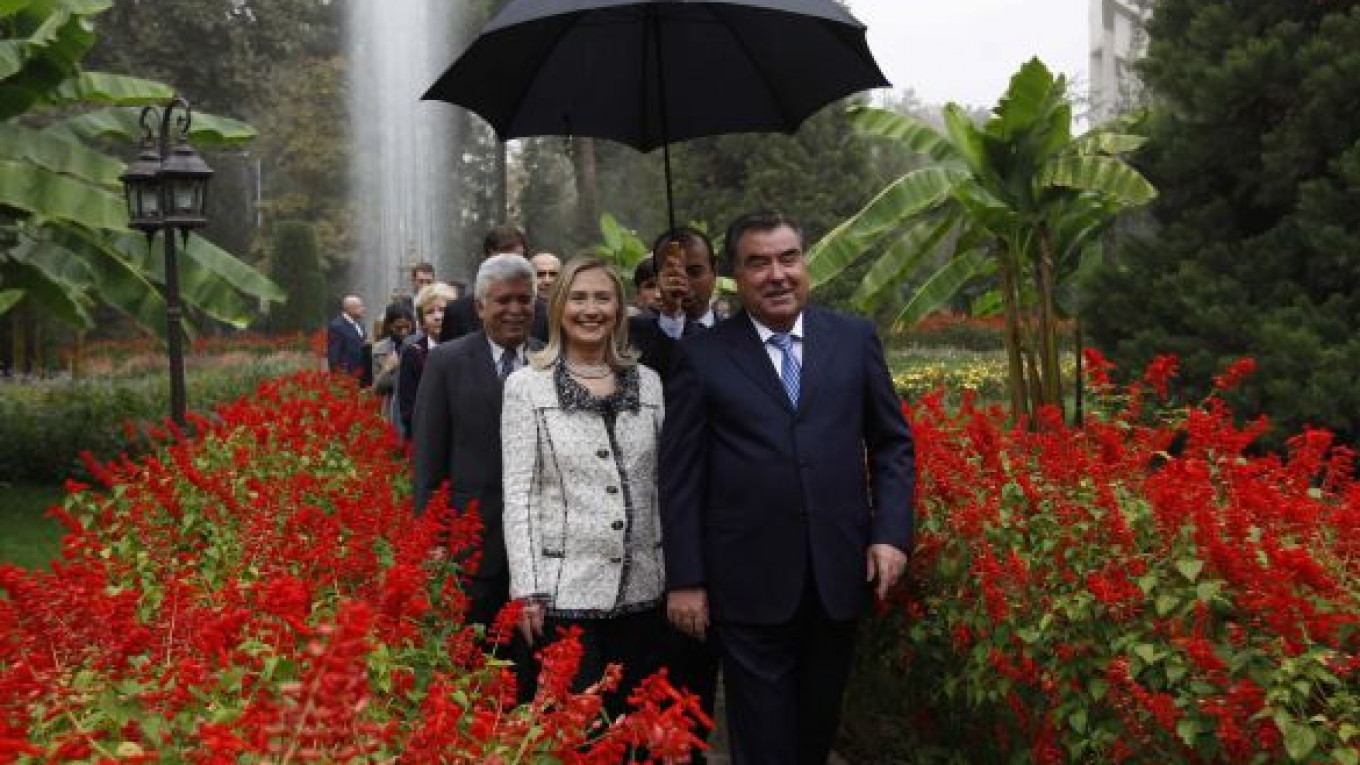TASHKENT, Uzbekistan — U.S. Secretary of State Hillary Clinton warned Tajikistan and Uzbekistan that efforts to crack down on religious freedom might backfire and lead to increased sympathy for radical views.
Clinton met Tajik President Emomali Rakhmon and Uzbek President Islam Karimov on Saturday to thank their Central Asian countries for their cooperation in the U.S.-led war in Afghanistan.
She stressed to both that freedom of religious expression was tied to the region's future security, U.S. officials said.
"I disagree with restrictions on religious freedom and shared those concerns," Clinton told a news conference after meeting Rakhmon in Dushanbe.
She said efforts to regulate religion "could push legitimate religious expression underground, and that could build up a lot of unrest and discontent."
Clinton's visit to the two countries came after a trip to Afghanistan and Pakistan that was focused on U.S. efforts to find a political solution to the decade-long Afghan conflict.
She also promoted greater regional economic integration under a plan U.S. officials have dubbed "the New Silk Road."
Karimov and Rakhmon have moved to limit religious freedom.
Tajikistan introduced laws in August to ban youths from praying in mosques, churches and other religious sites. Rakhmon has said tough measures are needed to stop the spread of religious fundamentalism.
"You have to look at the consequences," Clinton said in Tajikistan. "We would hope there would be a rethinking of any restrictions going forward, because we think it will increase sympathy for extremist views that would in turn threaten the stability and security of the country."
U.S. officials said Clinton also raised the issue during a 2 1/2-hour meeting with Karimov as one of a number of human rights concerns, which also included press freedom, human trafficking and political reforms.
Karimov, who has said he intends to make reforms, repeated these pledges to Clinton, one U.S. official said.
"He said he wants to leave a legacy for both his kids and his grandchildren," the official said. "The secretary welcomed that, and said that would help to build a long-term foundation for Uzbekistan but also for our cooperation."
Clinton defended her meeting with Karimov.
"If you have no contact, you have no influence," she said. "And other countries will fill that vacuum who do not care about human rights, who do not care about fundamental freedoms. So despite the challenge, I would rather be having meetings raising these uncomfortable issues, pressing for change, than to be totally outside and let others come in that only want commercial, political and other advantages."
Human Rights Watch has called on her to link improvements to continued U.S. engagement.
(Reuters, AP)
A Message from The Moscow Times:
Dear readers,
We are facing unprecedented challenges. Russia's Prosecutor General's Office has designated The Moscow Times as an "undesirable" organization, criminalizing our work and putting our staff at risk of prosecution. This follows our earlier unjust labeling as a "foreign agent."
These actions are direct attempts to silence independent journalism in Russia. The authorities claim our work "discredits the decisions of the Russian leadership." We see things differently: we strive to provide accurate, unbiased reporting on Russia.
We, the journalists of The Moscow Times, refuse to be silenced. But to continue our work, we need your help.
Your support, no matter how small, makes a world of difference. If you can, please support us monthly starting from just $2. It's quick to set up, and every contribution makes a significant impact.
By supporting The Moscow Times, you're defending open, independent journalism in the face of repression. Thank you for standing with us.
Remind me later.






